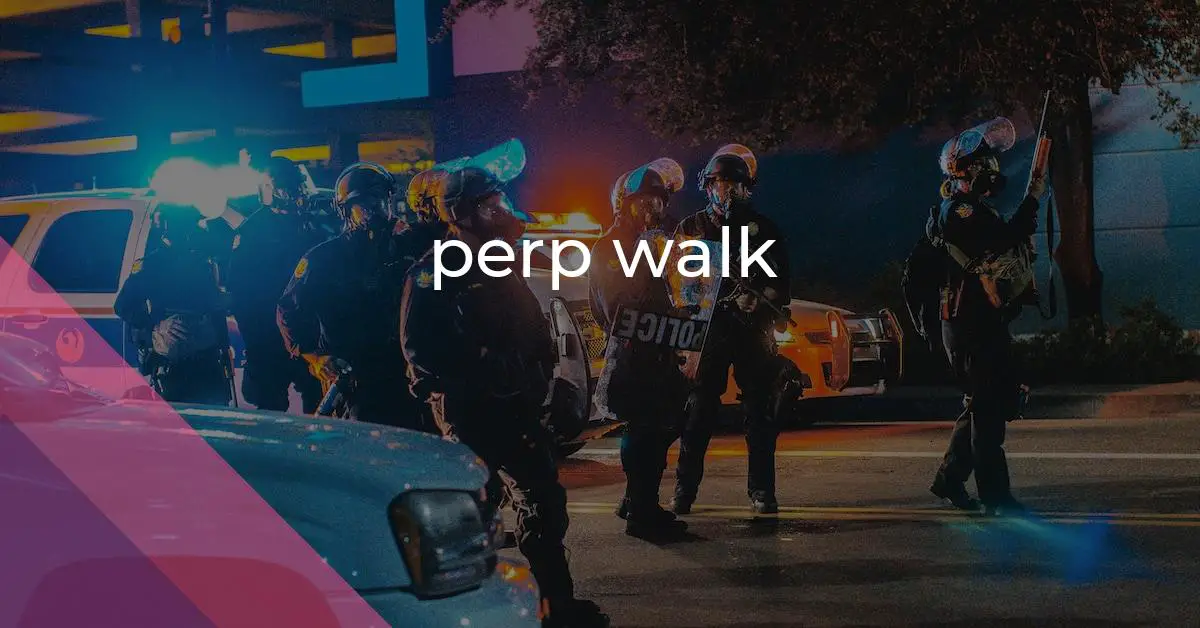perp walk: Idiom Meaning and Origin
What does ‘perp walk’ mean?
The idiom "perp walk" refers to the act of parading a suspect, usually in handcuffs and accompanied by law enforcement, in front of the media and public. This public display often takes place before the suspect's trial and is intended to showcase law enforcement's crime-solving efforts. The perp walk can have both legal and public relations implications.

Idiom Explorer
The idiom "walk the streets" means to roam or wander around in public places, typically on foot, often with a negative connotation associated with prostitution or illegal activities.
Put on the map is an idiom that means to gain recognition or become well-known. It refers to the act of bringing something or someone into public attention, making them more notable or important.
The idiom "par for the course" means that something is typical or expected in a given situation.
The idiom "parade passed someone by" means that someone has missed out on an opportunity or event, usually because they were not paying attention or were not involved. It suggests that the person has been left behind or is out of touch with what is happening around them.
The idiom "parade of horribles" refers to a series of unpleasant or alarming events, situations, or possibilities that are described or predicted one after another. It emphasizes the negative aspects and potential consequences of a particular situation or decision.
The idiom "paper trail" refers to a written record of past actions or events, typically used in legal or investigative contexts. It implies the presence of concrete evidence or documentation that can be traced and used to track someone's actions or verify their claims. The term highlights the significance of physical documentation in providing proof or establishing accountability.
The idiom "on the prowl" means to be actively hunting or searching for something, often with a sense of stealth or intention. It is commonly used to describe someone who is looking for a romantic or sexual partner.
The idiom "on the loose" means to be free or not captured, often used to describe a person, animal, or thing that is roaming or causing trouble.
The idiom "on eternal patrol" means the status of being in a constant or perpetual state of vigilance or duty, often used to describe members of the military or law enforcement who have passed away but are metaphorically still on duty.
Perp Walk: Criminals in Public Display
A perp walk is when law enforcement officials parade a handcuffed suspect in public to show their arrest. It's a common practice in the United States. The term "perp walk" comes from the words "perpetrator" and "walk."
In the 1980s, the media started using the term "perp walk" more often when covering high-profile criminal cases. The purpose of a perp walk is to shame and publicly expose the suspect before they've been formally charged or convicted. It's a way to generate negative publicity and damage the accused's reputation.
Some people criticize perp walks for potentially violating the rights of the accused, specifically the presumption of innocence. However, law enforcement officials argue that perp walks serve a legitimate purpose. They allow the public to see that action is being taken against alleged criminals and provide a sense of security.
One notable example of a perp walk was the case of financier Bernard Madoff, who orchestrated a massive Ponzi scheme. Madoff's perp walk, where he was led into court in handcuffs, received a lot of media attention and symbolized the collapse of his financial empire.
The legality of perp walks is often debated because they could infringe on an individual's right to a fair trial. Some people believe that the media attention around a perp walk can prejudice potential jurors, making it harder for the accused to receive a fair trial. Others argue that the public's right to know outweighs these concerns.
Perp walks have become a highly controversial issue within the criminal justice system. Critics argue that they prioritize media spectacle over the principles of justice. The use of perp walks varies across different jurisdictions in the United States, and there are calls for stricter regulations on their implementation.
Despite the criticisms, perp walks continue to be a common practice in high-profile criminal cases in the United States. They serve as a reminder of the media's power in shaping public perception and the potential impact it can have on an individual's rights and the fairness of the judicial process.
Perp walks are related to two idioms: "walk the streets" and "on the lam."
The idiom "walk the streets" is often used to describe the act of being out in public. In the context of a perp walk, it can be said that the suspect is literally walking the streets as they are paraded in public. The purpose of a perp walk is to expose the suspect and let them be seen by the public.
The idiom "on the lam" refers to someone who is on the run or trying to avoid being caught by law enforcement. While a perp walk may not involve a suspect who is actively trying to evade capture, it does involve someone who has been arrested and is now in the custody of law enforcement. The perp walk is a public display of their arrest, making it clear that they are no longer "on the lam."
Example usage
Examples of how the idiom "perp walk" can be used in a sentence:
- The police officer led the suspect out of the building in a perp walk, with cameras and reporters surrounding them.
- During the high-profile corruption trial, the accused politician had to do a perp walk into the courthouse every day.
- The celebrity's perp walk after being charged with assault became front-page news.
The idiom "perp walk" is typically used to describe the act of law enforcement authorities publicly parading a suspect, usually in handcuffs, in front of the media and onlookers. It often carries a negative connotation, implying the public humiliation of the individual before they have been proven guilty in a court of law. The term "perp" is an abbreviation for "perpetrator" or "suspected perpetrator." The purpose of a perp walk can vary, from law enforcement seeking to deter crime by showcasing successful arrests to media outlets seeking sensationalized news stories. Regardless of its intentions, the perp walk has sparked debates about the presumption of innocence and the ethics of pre-trial publicity.
More "Legal" idioms



